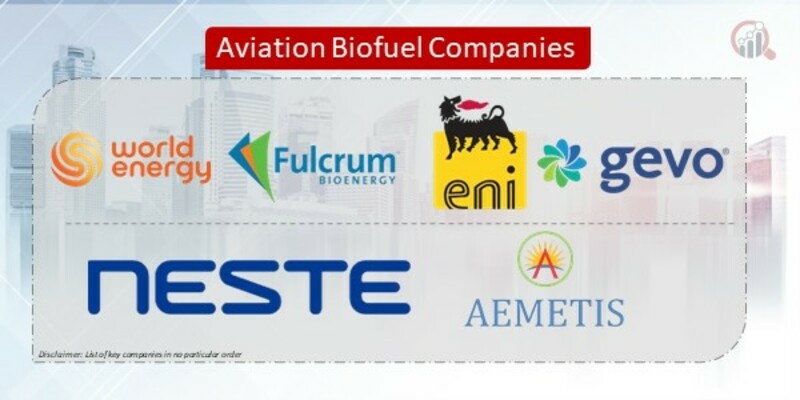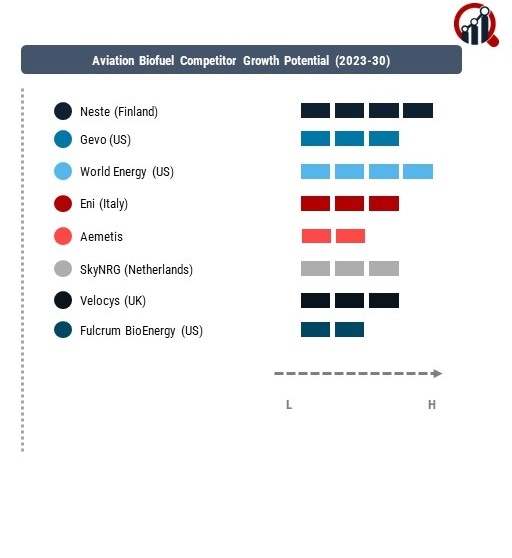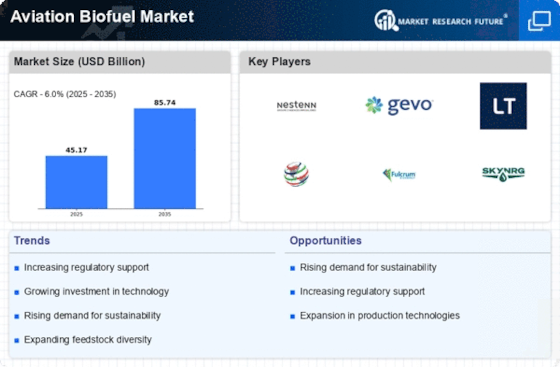Top Industry Leaders in the Aviation Biofuel Market

Strategies Adopted: Key players in the Aviation Biofuel Market employ various strategies to gain a competitive edge and drive market growth. These strategies include:
Feedstock Diversification: Companies invest in research and development to explore a wide range of feedstock sources for biofuel production, including agricultural residues, waste oils, algae, and lignocellulosic biomass, to ensure a sustainable and reliable supply chain.
Production Scale-Up: Scaling up biofuel production capacity through facility expansions, technology upgrades, and strategic partnerships enables companies to meet increasing demand from airlines and aviation stakeholders while achieving economies of scale and cost competitiveness.
Certification and Compliance: Obtaining certification and regulatory approvals for biofuels, such as ASTM D7566 and DEF STAN 91-91, is crucial for market acceptance and airline adoption. Companies work closely with aviation authorities and industry stakeholders to ensure compliance and facilitate market penetration.
Strategic Partnerships: Collaborative partnerships with airlines, aircraft manufacturers, airports, government agencies, and biofuel producers enable companies to co-develop biofuel supply chains, establish distribution networks, and promote the use of SAF through joint marketing initiatives and incentives.
Key companies in the aviation biofuel market include.
Neste (Finland)
Gevo (US)
World Energy (US)
Eni (Italy)
Aemetis
(US)
SkyNRG (Netherlands)
Velocys (UK)
Fulcrum BioEnergy (US)
Factors for Market Share Analysis: Several factors influence market share in the Aviation Biofuel Market, including:
Feedstock Availability: Access to sustainable and abundant feedstock sources at competitive prices is critical for biofuel production and determines the scalability and cost-effectiveness of biofuel supply chains.
Production Efficiency: Companies that employ efficient conversion technologies, such as hydroprocessing, Fischer-Tropsch synthesis, and microbial fermentation, to produce biofuels with high energy density and low carbon intensity can gain a competitive advantage in the market.
Price Competitiveness: Competitive pricing and stable pricing mechanisms for biofuels compared to conventional jet fuel prices are essential for attracting airline customers and driving market adoption of SAF.
Regulatory Support: Supportive policies, incentives, and mandates from governments and aviation authorities, such as renewable fuel standards, carbon pricing mechanisms, and tax credits for biofuel producers, play a significant role in shaping market dynamics and accelerating biofuel deployment in aviation.
New and Emerging Companies: In addition to established players, new and emerging companies are entering the Aviation Biofuel Market, bringing innovative technologies and business models to the table. Some notable new entrants include:
LanzaJet Inc.: Specializes in alcohol-to-jet (ATJ) technology for producing sustainable aviation fuels from ethanol, renewable feedstocks, and industrial waste gases.
Fulcrum BioEnergy, Inc.: Focuses on converting municipal solid waste into low-carbon transportation fuels, including aviation biofuels, through its proprietary gasification and Fischer-Tropsch synthesis process.
Red Rock Biofuels: Develops biorefineries that convert woody biomass into renewable diesel, SAF, and other bio-based products using Fischer-Tropsch synthesis technology.
REG Synthetic Fuels: Engaged in the production of synthetic hydrocarbon fuels from renewable feedstocks, such as fats, oils, and greases, through its proprietary catalytic conversion process.
Industry News and Current Investment Trends: Recent developments and investment trends in the Aviation Biofuel Market reflect a growing momentum towards sustainable aviation and decarbonization efforts. Key highlights include:
Airline Commitments: Major airlines and aircraft operators worldwide are committing to reducing their carbon emissions and increasing the use of SAF in their fleets as part of their sustainability initiatives and corporate social responsibility commitments.
Government Funding: Governments and international organizations are allocating funding and grants to support research, development, and commercialization of biofuels, accelerate technology innovation, and incentivize investment in biofuel production facilities.
Market Partnerships: Strategic partnerships between biofuel producers, airlines, fuel suppliers, and aviation stakeholders are facilitating the expansion of biofuel supply chains, establishing long-term offtake agreements, and driving market growth through collaborative initiatives.
Overall Competitive Scenario: The Aviation Biofuel Market presents significant growth opportunities and challenges for companies aiming to capture market share and establish a leadership position in sustainable aviation fuels. Established players with strong technical capabilities, supply chain expertise, and regulatory compliance track record are well-positioned to capitalize on market demand and drive innovation in biofuel production. However, new entrants and emerging companies with disruptive technologies, novel feedstock solutions, and scalable production processes have the potential to reshape the competitive landscape and accelerate the transition to a low-carbon aviation future. As the aviation industry continues to prioritize sustainability and environmental responsibility, companies that demonstrate commitment to innovation, collaboration, and regulatory compliance will remain competitive in the evolving market for aviation biofuels.
Aviation Biofuel Industry Developments
For instance,
January 2022
Johnson Matthey launched an innovative technology, HyCOgenTM, by converting captured carbon dioxide (CO2) and green hydrogen into sustainable aviation fuel (SAF) using FT technology.
For instance,
February 2022
Boeing announced a supply agreement for two million gallons of blended renewable aviation fuel with EPIC Fuels to power its commercial operations in Washington state and South Carolina by the end of 2022.











